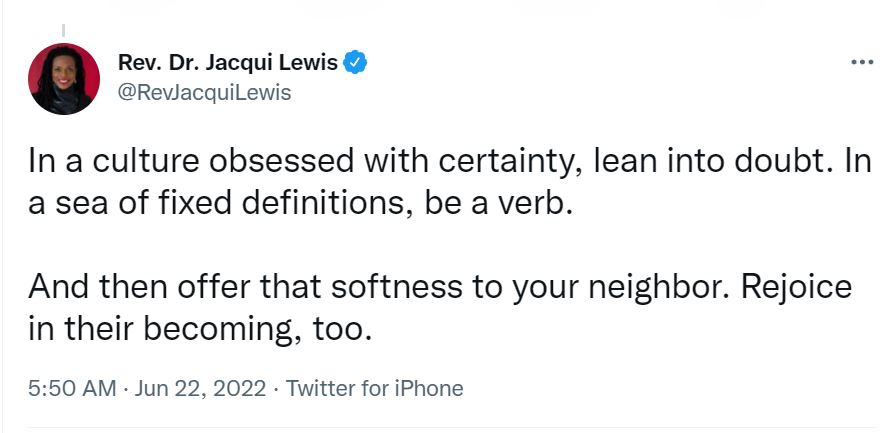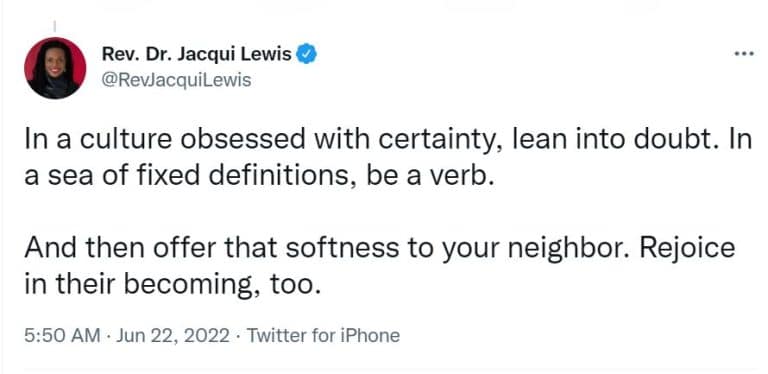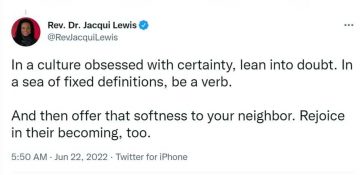Quick backstory before I jump into the main story: I finished a PhD at the University of Oregon in June where parking was a mess. It was expensive and even if you paid for a pass, you often couldn’t find a spot if you got there after 8am. I rode my bike the 4 miles to campus for over a year, but after being hit by a car on my way, I was too scared to get back on my bike. So my solution was to take an institute class each quarter where they gave you a free pass in exchange for your enrollment/attendance. So that’s why I’m 35 years old and found myself in institute classes each term.
One day in institute the lesson turned to “doubts” and the class discussed how important it is to talk about your doubts with believers – rather than other doubters. Russell M Nelson’s talk was quoted where he says, “Stop increasing your doubts by rehearsing them with other doubters.” Class members discussed how important it is to create a safe space where people can discuss their doubts at church so they aren’t rehearsing them with other doubters.
Fast forward to the next week when the institute teacher asked the class whether we’d like to have a whole term on the topic of something like “Recent General Conference Talks.” As the class discussed the excitement of the prospect, I stayed silent. Then the teacher asked me specifically, “Miriam, what do you think? Would you take that class?”
I took a deep breath. Here was my chance to express my doubts in this “safe space” we’d discussed needing. So I went for it, “Well, I have a hard time with watching General Conference because it’s hard for me to spend a whole weekend watching mostly white men speak and not feel like there is inequality in the church.”
I’m not sure what I was hoping for in that moment. I guess I wanted everyone to validate my feelings and for it to honestly feel like a safe space.
Instead it was … a fumble.
The teacher was clearly taken aback, but did at least mention that he’d try to make an effort to focus on women’s voices too. It wasn’t the worst outcome it could have been. But it also could have been better.
So here’s what I’ve decided (and perhaps this is a completely masochistic decision): but I’m going to keep expressing doubts in church meetings where that’s been traditionally uncommon. I’m hoping to change those traditions – perhaps maybe one of those fumbles can turn into a complete pass. I want to create safe spaces where I can express doubts – but where I can also listen to other people express doubts.
This Tweet by Rev. Dr. Jacqui Lewis really spoke to me:

The Mormon culture is so obsessed by certainty. I’m going to take Rev. Dr. Jacqui Lewis’s advice and lean into doubt and be that verb. And I’m going to create spaces where others can see that I’ll be there for them.
Have you tried creating these safe spaces in your wards and branches? How many fumbles have there been so far? Any complete passes? Even 1 (crossing fingers I’ll get to hear about 1)?






20 Responses
Thank you for writing these articles. I enjoy reading about your viewpoint.
Often when I express a differing/critical opinions in a church setting, especially one that brings into question the wisdom of either leaders or God in a certain situation, I am met with the teacher or other people present being “taken aback” in the sense that they’re not sure what to say at first and not sure what to do at first. Many members interpret this uncomfort as a loss of the spirit, unfortunately, and so they try to avoid making these types of comments.
Two quick examples: 1) I commented that when heavenly father tells Job at the end, “I created the earth and you simply need to trust me.” That it was like me as a soccer referee saying after a called foul, “I have the whistle! So trust me!” instead of even briefly explaining the call. I mentioned in class that I thought God missed a teaching moment there (critical to God, or at least critical to the author of the allegory of Job). 2) In the early days of the church, Joseph (speaking in God’s voice in the D&C or as a prophet) would threaten people with “destruction” if they did not obey him/Him. For example, when Emma didn’t like polygamy, Joseph threatened her with eternal destruction unless she agreed. I mentioned in class that I was glad that leaders don’t threaten members with destruction as much now as they used to.
But my experiences been almost uniformly positive after these types of statements because most of them have a similar reaction to your teacher. They often try to slightly accommodate or understand, and then things move on. And I count these reactions as a win because I wasn’t shut down, and no one got upset. So in that sense, I think that many classes and settings in the church are fairly safe even if people do not outright and enthusiastically understand or agree immediately. I would more characterize your and my experiences as “slight yardage gained” rather than a “fumble”.
Ben Barrowes
“I want to create safe spaces where I can express doubts – but where I can also listen to other people express doubts.” Yes! One of my best friends was completely turned off to Mormonism when missionaries approached her claiming we have all the answers. She ended up becoming Jewish and told me one of the main reasons is that she felt there was more tolerance for not having all the answers.
Dear Miriam, I think I understand how General Conference is a reminder of inequality in the church for you. In the situation you described, what reaction/ response/ outcome represents a complete pass?
I think I wanted them to validate my feelings. Either say something like, “I can see how you’d feel like that and that sounds hard” or maybe “Wow, it sounds like that’s a hard weekend for you. Would you like to tell me more about that”
I’m one of those old white men that you mention. What suggestions do you have for me if I want to do better at making a safe space for those who are around me?
I am not the author but I really appreciate this question. Because the authority and power in our church so often rests with old white men it is those same men who can effectively help change things!
I find it very meaningful when a man in authority defers to a female or minority voice rather than filling class time with his own thoughts, especially when it’s done intentionally. For example, raising your hand in a Sunday School class and then saying you’d like to hear a female or minority perspective. Or following up a comment that might cause discomfort by thanking the person for sharing and including your own doubt or question.
If you’re speaking in sacrament meeting ask if the other speaker is a female and, if so, ask not to speak last. When planning activities don’t default to gender norms for various tasks (men setting up chairs, women providing food, etc).
It’s been my experience that if the old white men in a ward start doing things like this many others will take the lead. Thank you for being willing to ask what you can do!
I love that you are asking this question, and I wish that many more old white men would ask “What can I do?”
You are also not the first man to ask this question. I think the five points made in this article are a pretty good place to start:
https://www.cbeinternational.org/resource/article/mutuality-blog-magazine/how-use-male-privilege-create-space-and-opportunities
I’ve noticed an odd pattern at church that if someone feels something they assume everyone else feels it too (e.g., if they love GC, they can’t imagine how someone else might not). Not only does this contradict our belief in personal revelation, but it makes it really hard for people who aren’t fitting the full-scale rhetoric that they are “supposed” to say/do/feel. Perhaps just understanding that everyone is feeling something different would go a long way.
I have experience with these assumptions, even with just basic information. One time they discussed things in ward council and then assumed I knew about it (it involved a YM fundraiser areation project my boys were in). My friends had paid to have their yards aereated every year and the ward council decided to exclude my neighborhood. They didn’t announce this information. When my neighbors asked about it I asked questions of several leaders and no one would answer me.
Then a leader said they would include my friends. But then they didn’t show up. I called the person in charge to ask about it and he blew up at me on the phone and said I shouldn’t have been going around trying to change the ward council’s plan. I had to explain that neither my husband or I are on the ward council so we didn’t know what their decisions were.
I try. But there are so few real opportunities. My bishop interrupted me during my testimony once. The next month he was clearly worried about something since he had the stake president there (probably to keep an eye on me).
I say what I want in social media even though there have been repeated talks in my ward telling us to avoid social media, and if we are on social media to “scroll past and never comment”.
I stayed home and raised my kids. Social media is an important connection to the world for me. I love commenting and discussing and thinking and pondering. Apparently this is a problem for them. They have said “Don’t post. Anybody could see what you post.”
Well… I would love to have a voice in my ward, but really I don’t. I haven’t been asked to speak for several years. I WANT people to see the things I post.
I want to be heard. I am receiving a message, hopefully unintentional, that my ward and stake leadership would like me to be silenced.
They have a women’s role for me that feels like I am being erased. At least I am listened to on social media.
I’m sorry, that sounds really tough!
One of my core memories is of a woman in our Wymount ward at BYU admitting, unashamedly, that she struggled a lot with the temple. She didn’t qualify or resolve it. As someone who can point to the temple as the turning point (not for the better) of my relationship with Heavenly Father, I remember feeling a sudden rush of relief and mortification. I never thought I could actually *say* that temple worship had actually harmed my testimony. I am so grateful she felt the courage to share her doubts. It set a really great example of leaning into the vulnerabilities that faith requires. Thank you for your resolve in being that person for others.
It can be so lonely to struggle with the temple and have no place to talk through meaningful concerns. It really helps when someone is willing to share and let other people know they aren’t alone.
I love that you put that “she didn’t qualify or resolve it.” At church, people often like the rhetoric of “I was struggling, but now I’m done struggling.” It’s important to just be able to say, “This is hard for me” with no mention that it might be resolved.
Thanks for sharing that example of someone willing to lean into their vulnerabilities.
For me, so much of the experience of sharing doubt, questions, and (respectful) disagreement has depended on the teacher’s comfort with difference. I think a leader, whether a teacher or perhaps a Relief Society president or bishop, makes room for difference and disagreement, the experience of the class can change from a ritual of repeating acceptable answers to a real conversation and learning experience. But as a student, I haven’t had much sucess in creating an enviroment that can tollerate difference if that is not the mindset of the teacher/leader. I think there is a degree to which individual class members can “lead from the bench,” so to speak, and make the overall experience more open and accepting, but I haven’t experiences a “complete pass” with teachers/leaders who aren’t already interested in creating that kind of space for difference and discomfort.
“a ritual of repeating acceptable answers”
Yes, that is what we go through constantly! And you’re probably right, sometimes it really doesn’t work as a student.
I believe in being honest–especially at church. I find it ironic that church is often the hardest and scariest place to be honest.
I’ve got a story that made a complete pass! It was a 5th Sunday combined lesson. We were discussing how some church leader had directed us to read the Book of Mormon every day. There were plenty of comments bearing testimony about the brand new Come Follow Me curriculum (we were reading BoM that year). The teacher was about to move on to the next point when I got brave and raised my hand. I said that I actually really struggled with the directive to read the BoM every day because I felt strongly that God wanted me to be studying the book of Daniel (of all things!). My comment completely derailed the rest of the time and we had a really good discussion. Someone made a comment that really stuck with me: “A resource is something you use when you need help. Come Follow Me is a resource that is available. But if you don’t need help in your relationship with God, it might not make sense to use the resource.”
Congrats on the complete pass!
I experienced a fumble once when I raised a question in elders quorum. The lesson was on truth-telling or something like that, and we read this absolutist quote from Brigham Young where he said something along the lines of the idea that in a Zion society, we would all tell each other the complete truth all the time. I commented that I couldn’t imagine that was actually the case. Would we tell each other the full truth about what we thought of one another’s clothing choices, for example? A hardliner in the class responded immediately and told me that Brigham Young was a PROPHET and that he was therefore RIGHT and I was WRONG. I didn’t press the issue.
Oh gosh, the idea of the infallibility of prophets is one that permeates Mormon culture way too intensely. It makes it impossible for the church to progress. As an example, I think it’s why the church hasn’t formally apologized about the priesthood ban for Blacks. That would require admitting that the policy was actually wrong and not [insert whatever racist explanation you’ve heard a million times].